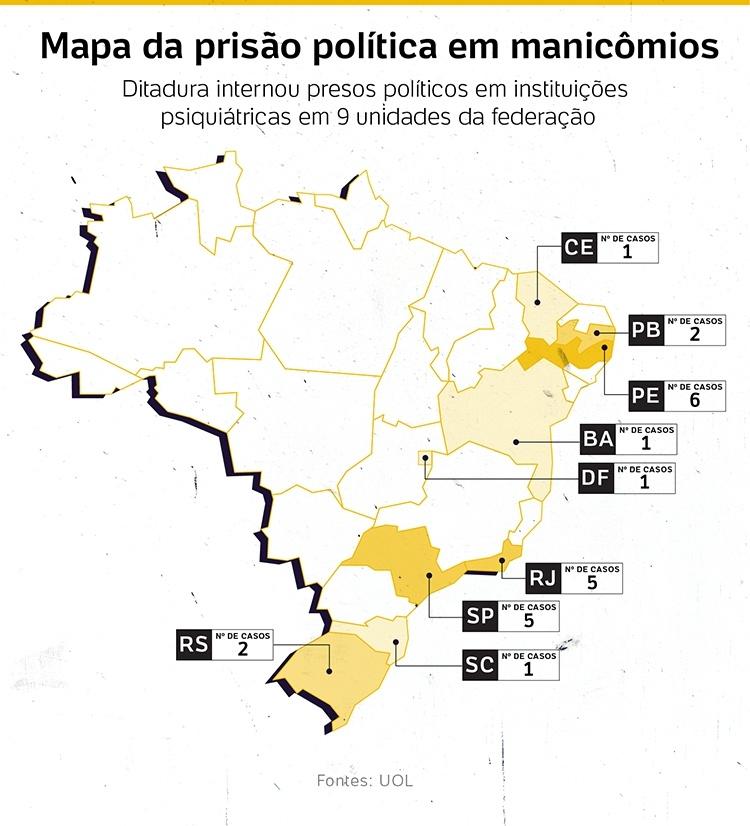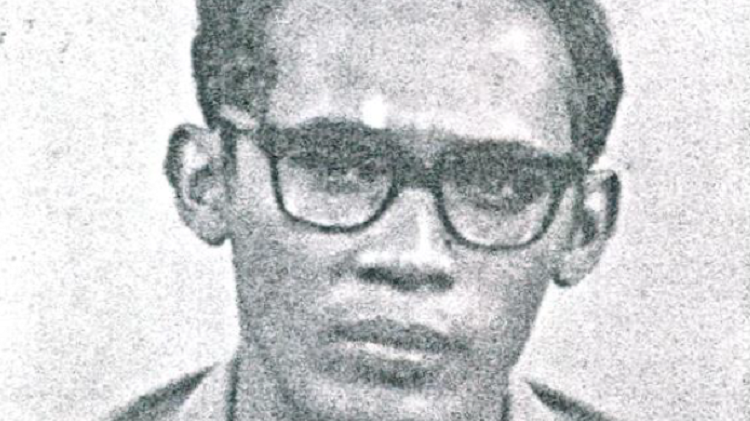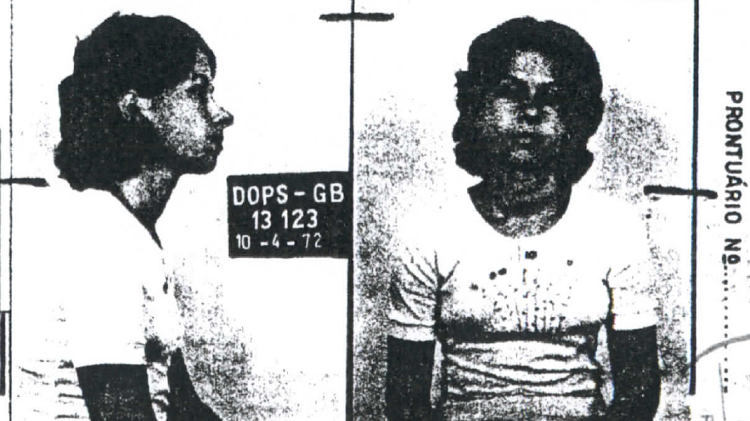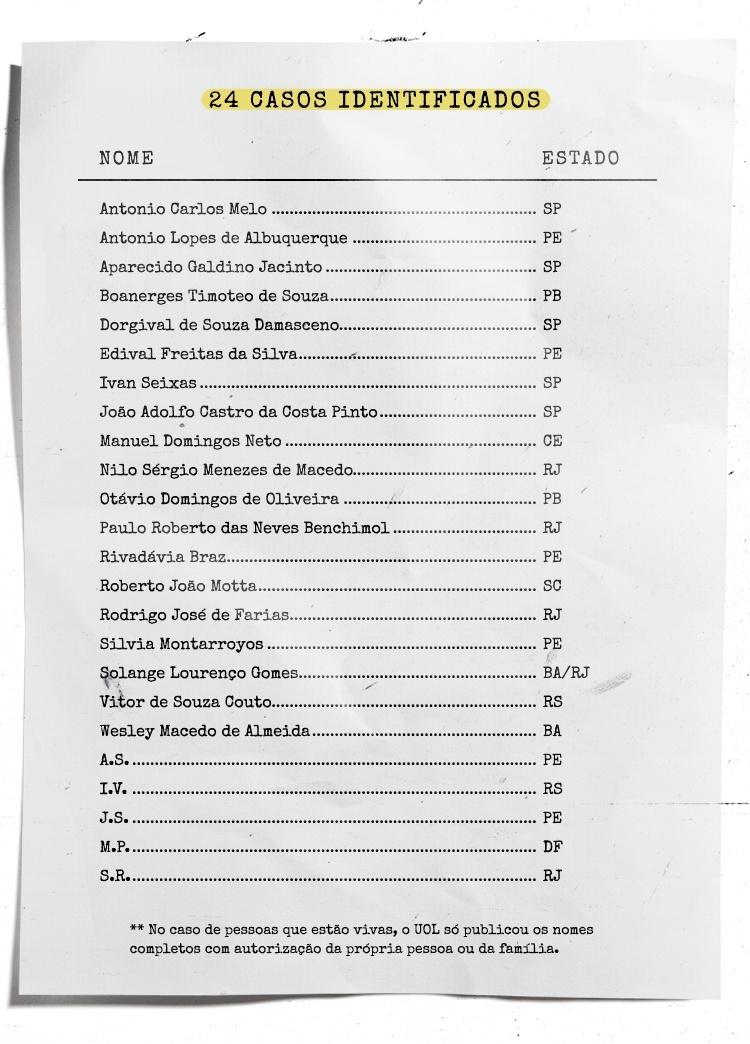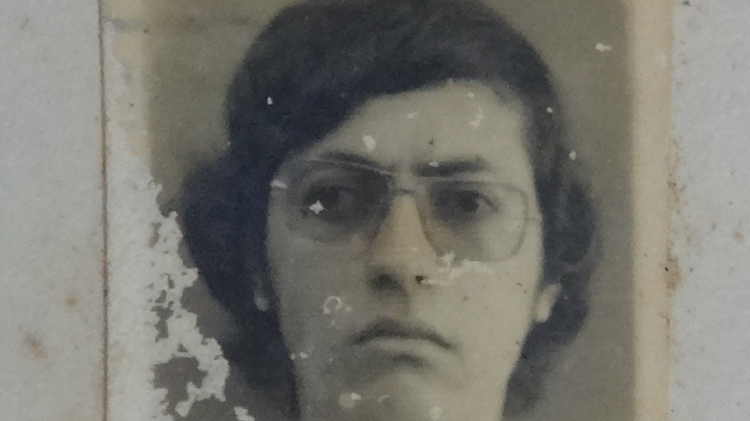Politics
Learn the stories of political prisoners interned in shelters.
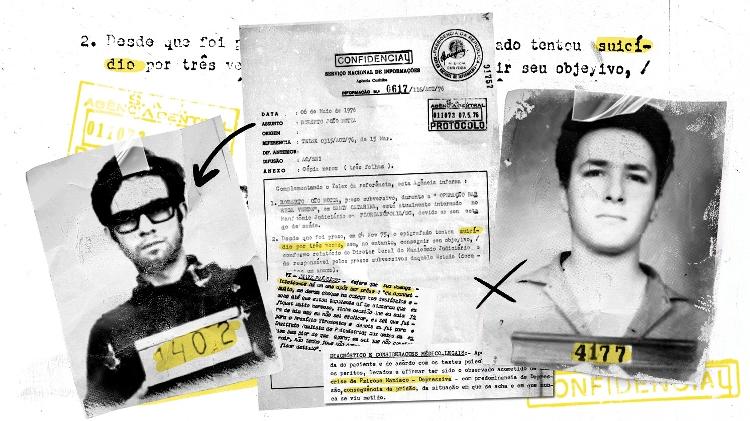
Unpublished review UOL uncovered 24 cases of internment of political prisoners by the military dictatorship in psychiatric institutions. There are 21 men and three women in nine federation units. The number may be greater than the one indicated in the report.
Find out more about the history of some of these political prisoners below. ABOUT UOL it only publishes the full names of those who have already died, or, in the case of the living, with the permission of the individual or family. The rest of the cases are indicated with initials only.
Of the 24 cases, at least 22 were tortured in regular prisons prior to internment. This is the case of Paulo Benhimola, who began to hear voices similar to ” [a voz de] one of those agents who interrogated me “and who said that” it is in the hands of the devil again. “SR lost his memory after ten days of electric shock.
In the institutions where they were interned, some political prisoners continued to be ill-treated. In Pernambuco, JS spent “two years with speech and movement difficulties” due to high doses of psychiatric drugs. In Rio, Solange Gomez was treated with electroshock and seizure therapy (seizure induction).
In response to an inquiry, the Department of Defense stated that “facts relating to the period from 1964 to 1973 are subject to the Amnesty Act.”
Aparecido Galdino Jacinto, Sao Paulo
An illiterate farmer, Aparecidao, as he was called, was a religious leader in Rubinea, deep in São Paulo. In 1970, he and his followers opposed the flooding of their lands for the construction of the Ilha Solteira hydroelectric power plant – the work of the dictatorship. They were arrested for resisting police violence at the temple where they were gathering.
According to military justice, Aparecidao had “delusional ideas of a mystical nature.” Under the National Security Act, he was sentenced to two years in the Franco da Rocha asylum. As a result, he stayed for seven years.
He was released after a new forensic scientist declared that he could not be considered insane because of his belief: “The idea of a man in [ser] healer, preach peace, goodness, say that his power was a gift lent to him by God? If this were so, justice would be full of criminal acts against the Pope, cardinals, bishops, priests, pastors, mediums and all others who call on the name of the Lord. “
MR, Rio de Janeiro
When a political prisoner walked in front of Sir’s cell at the Ilha das Flores prison in Rio de Janeiro, he heard the call: “I can’t take this anymore.” He asked them to report his situation abroad because the military wanted him to report facts he did not know. He was accused of organizing the Brazilian Revolutionary Communist Party.
One of the activists, who lived with the SR on Ilha das Flores, included his case in the text of the accusation: “A prisoner at the age of 20 spent 20 days in solitary confinement, beat him daily for a month; memory loss after 10 days of electric shock, stick. -de-arara. He was interned in a court shelter because of his mental state. “
Nilo Sergio Menezes de Macedo, Rio de Janeiro
After a period of imprisonment in Minas Gerais, Macedo was sentenced to four years of imprisonment at the Judicial Hospital. Heitor Carrillo in Rio. “They claimed that I had mental problems. I was crazy, not at all, says Macedo.
“The orphanage was a hell of a place, a very tough environment. [Quem estava lá eram] people with serious mental health problems who have committed common crimes such as murder. I got an electric shock, I had to take very strong drugs. I stayed there for about seven months. Then I thought: if I stay here, my life will be in jeopardy. I hate being here. Then I tried to escape and I was caught. “
After attempting to escape, Macedo was taken out of the orphanage and sent back to a regular prison on the island of Ilha Grande. “This is what saved me.”
Roberto Joao Motta, Santa Catarina
Mott’s lawyer was arrested in Santa Catarina on charges of belonging to the Brazilian Communist Party. In a letter to the Archdiocese of São Paulo, his wife condemned “the torture to which her husband was subjected by the army and the police. Unable to bear the suffering any longer, he tried to commit suicide three times. Then he was sent to prison. Judicial asylum.”
Finally, the military court authorized his transfer to a private psychiatric clinic, the costs of which were paid by the family, but did not cancel his arrest – the family also had to pay the costs of the police officers who guarded him.
JS, Pernambuco
ALN (Aliança Libertadora Nacional) member JS was arrested, tortured and sent to various institutions for psychiatric treatment under police escort.
In documents sent to the Pernambuco Remembrance and Truth Commission, he said that he had received very high doses of psychiatric drugs, “almost died of an overdose”, and in another situation – “two years with difficulties in speech and mobility.”
Paulo Roberto das Neves Benjimol, Rio de Janeiro
The journalist Benchimol was imprisoned in Ilha das Flores on charges of belonging to MR-8 (Revolutionary Movement of October 8).
Exhausted, he began to hear voices “saying that I am back in the hands of the devil.” “The voice is similar to the voice of one of those agents who interrogated me. Sometimes the voice spoke directly to the agent, accusing me, exactly at the moment when the interlocutor accused me, ”Benchimol told the experts who drew up his psychiatric report.
He was sent to a court asylum, where he was “subjected to intensive psychiatric treatment,” according to a report from the time. He received “a series of eight electric shocks, and the changes in his depression are not yet noticeable. There are still three suicide attempts recorded in the medical record. ”
After his arrest, Benchimol left for Chile. In 1973, as a result of the coup by Augusto Pinochet, he was detained and tortured at the National Stadium in Santiago.
Solange Lorenzo Gomes, Bahia and Rio de Janeiro
A member of MR-8 (October 8 Revolutionary Movement), Solange was wanted when she began hallucinations. He decided to give up. In the newspapers of the time, she was portrayed as a “repentant terrorist” attracted by “sex” to subversive activities. In prison, “he was the victim of horrific visions.”
At the trial in a military court, she was found incapable of responsibility, that is, unable to answer for her actions, and sentenced to a term of compulsory placement in psychiatric institutions. She was treated with electroshock and convulsive therapy (induction of seizures).
After being released, she did not recover. “I have witnessed her tremendous efforts to recover from a serious mental, psychotic condition as a result of her arrest,” her husband told the Commission on Political Disappearances. Solange committed suicide in 1982.
Vitor de Sousa Couto, Rio Grande do Sul
A soldier of the Rio Grande do Sul military brigade, Couto was guarding Leonel Brizola’s house when the military coup took place. After Brizola went into exile in Uruguay, Koutu went to the barracks and was immediately arrested.
Expelled from the troops, he was placed in a court shelter, from which he sometimes escaped.
In his testimony, he said that he was forcibly hospitalized on the grounds that after falling while serving in the army, he “began to suffer from epilepsy.” In one of his escapes, he went to Uruguay, where he attempted suicide, “because he was desperate, afraid to return to Brazil and be arrested again.”
Manuel Domingos Neto, Ceara
A member of the AP (People’s Action), he was arrested and physically and mentally tortured. He could not sleep because he was awakened by the blows or screams of women – which he thought came from a militant friend who was also in prison, or from her sister, who, according to the torturers, was “on a stick.”
He walked in “desperate and thought of suicide.” “I was very frail, weighed 40 kg. I passed out and spent ten days without the slightest idea of things. Then they took me to a military hospital, where I was imprisoned for many months, ”the armed men observed.
“His mental state” was such that he “had to take 20 psychotropic pills every day.”
Wesley Macedo de Almeida, Bahia
A student in Jackie, Bahia, and one of the founders of the city’s film club, he and his colleagues were arrested after “a veritable avalanche of subversive brochures swept across the city.” Sent to El Salvador, he was greatly tortured. His family went to the state capital of Bahia to look for him, but Wesley was not imprisoned. “When they found him, he was already at the orphanage,” says the younger brother.
To this day, he still needs psychiatric treatment. “Before the prison he had nothing. It could even be latent, but it developed in prison, ”says a relative. “The torture affected him, people cannot bear what he went through. In a sense, he remains a political prisoner. He remains a recluse, does not leave the house due to injuries and illnesses. [psíquica]… “
IV, Rio Grande do Sul
Arrested by the military dictatorship, he was sent to the Porto Alegre military hospital for psychiatric treatment in 1970. “In prison, he felt deprived of everything, he cried all day, covering his head with his hands, he could not eat, he could not sleep,” says one of the documents of the military justice about him. “I was living in anticipation of something worse,” and I had “symptoms of severe nervous depression.”

General internet buff. Hardcore music maven. Typical foodaholic. Friendly student.
Politics
The dollar continues to reflect the political scenario

Yesterday, financial agents evaluated the opposite decision of the Federal Supreme Court (STF) regarding the so-called secret budget. In addition, a decision was made by STF Minister Gilmar Méndez to issue an injunction that would exclude the Bolsa Família from the spending cap rule, with investors trying to understand how this measure would affect the processing of the transitional PEC in the Chamber of Deputies. Oh this PEC!!!!
Since he is an exchange investor, any reading that the budget will be exceeded or become more flexible will negatively affect the exchange market, whether through the PEC or in any other way. We will continue with volatility today.
Looking beyond, the US Central Bank (Fed), although slowing down the pace of monetary tightening at its December meeting, issued a tougher-than-expected statement warning that its fight against inflation was not yet over, raising fears that rising US interest rates will push the world’s largest economy into recession.
The currency market continues to react to political news. The voting on the PEC is saved for today. It is expected that it will indeed be reviewed to open the way tomorrow for discussions on the 2023 budget.
For today on the calendar we will have an index of consumer confidence in the eurozone. Good luck and good luck in business!!

General internet buff. Hardcore music maven. Typical foodaholic. Friendly student.
Politics
Andrés Sánchez consults with the Ministry of Sports, but refuses a political post.

The former president of the Corinthians dreams of working for the CBF as a national team coordinator. He was consulted shortly after Lula’s election.
Former Corinthians president Andrés Sánchez was advised to take a position in the Ministry of Sports under the administration of Lula (PT). However, he ruled out a return to politics. dreams of taking over the coordination of CBF selectionHow do you know PURPOSE.
No formal invitation was made to the former Corinthian representative, only a consultation on a portfolio opportunity with the new federal government, which will be sworn in on January 1, 2023.
Andrés was the Federal MP for São Paulo from 2015 to 2019. At that time he was elected by the Workers’ Party. However, the football manager begs to stay in the sport, ruling out the possibility of getting involved in politics again.
Andrés Sanchez’s desire is to fill the position of CBF tackle coordinator, which should become vacant after the 2022 World Cup. Juninho Paulista fulfills this function in Brazil’s top football institution.
The former president of Corinthians was in Qatar to follow the World Cup along with other figures in Brazilian football. During his time in the country, he strengthened his ties with the top leadership of the CBF.
Editors’ Choice

General internet buff. Hardcore music maven. Typical foodaholic. Friendly student.
Politics
The EU has reached a political agreement on limiting gas prices – 19.12.2022

BRUSSELS, DECEMBER 19 (ANSA). European Union countries reached a political agreement on Monday (19) to impose a natural gas price ceiling of 180 euros per megawatt hour (MWh). The main sources of income for Russia and the minimization of the use of energy as a weapon by the regime of Vladimir Putin.
The agreement was approved by a supermajority at a ministerial meeting of member states in Brussels, Belgium, after months of discussions about the best way to contain the rise in natural gas prices in the bloc caused by Russia’s invasion of Ukraine. .
The value set by the countries is well below the proposal made by the European Commission, the EU’s executive body, in November: 275 EUR/MWh. However, the countries leading the cap campaign were in favor of an even lower limit, around 100 EUR/MWh.
Germany, always wary of price controls, voted in favor of 180 euros, while Austria and the Netherlands, also skeptical of the cap, abstained. Hungary, the most pro-Russian country in the EU, voted against.
The instrument will enter into force on 15 February, but only if natural gas prices on the Amsterdam Stock Exchange exceed 180 euros/MWh for three consecutive days. In addition, the difference compared to a number of global benchmarks should be more than 35 euros.
Italy, the EU’s biggest supporter of the ceiling, has claimed responsibility for the measure. “This is a victory for Italy, which believed and worked for us to reach this agreement,” Environment and Energy Minister Gilberto Picetto tweeted.
“This is a victory for Italian and European citizens who demand energy security,” he added.
Currently, the gas price in Amsterdam is around 110 EUR/MWh, which is already a reflection of the agreement in Brussels – in August the figure even broke the barrier of 340 EUR/MWh.
However, Russia has already threatened to stop exports to countries that adhere to the ceiling. (ANSA).

General internet buff. Hardcore music maven. Typical foodaholic. Friendly student.
-
World4 years ago
The Gabby Petito case. Brian Landry set up camp with his family after his girlfriend disappeared
-
Top News6 years ago
Tristan Thompson reacts to Khloé Kardashian’s new appearance
-
Economy3 years ago
Everything has been delivered. 10 Bugatti Centodieci are already in the hands of the owners
-
Top News6 years ago
TLC ‘sMothered’ recap: ‘Party curled up,’ boyfriend problem
-
Top News6 years ago
Alex Cooper hosts a solo podcast
-
Top News6 years ago
2021 Ford Bronco price: Here’s how much the 2-door and 4-door cost
-
Tech5 years ago
Fall Guys is supplying out a legendary costume and Kudos as an apology present
-
Top News6 years ago
Chiara de Blasio was ‘very cold’ during the arrest of the protest: witness


